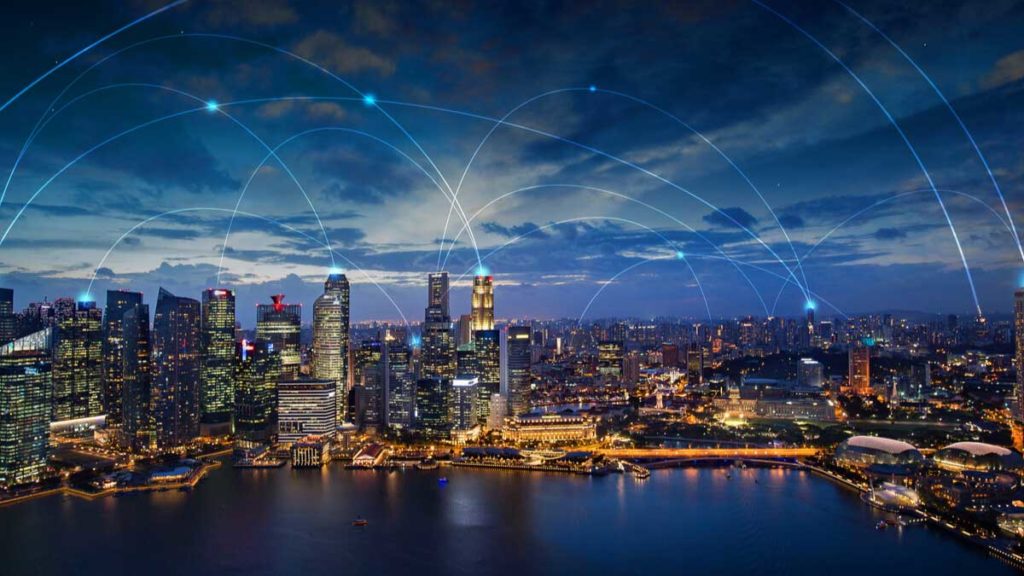
Despite the Covid-19 pandemic, the 5G rollout in Singapore is still on track. “It’s a long-term investment that reflects the confidence of Telecom in the economy. We’re talking about a license for 15 years, so it’s not about today, or tomorrow, or even next year” said S Iswaran, Minister for Communications. On June 24, 2020, the country’s telecommunication regulator, Infocomm Media Development Authority (IMDA) issued final awards to three telecoms- Singtel, Starhub, and M1. Australia’s Telecom TPG-Singapore’s fourth telecom operator- who submitted a separate bid did not win the bidding. However, TPG has selected Huawei as its key vendor and will be allowed to operate smaller 5G networks that provide spot coverage using airwaves that are in abundance.
On October 17, 2019, IMDA announced plans to have at least 50% of the city-state covered with a standalone network by the end of 2022. The standalone network uses 5G technology to support developing autonomous vehicles and the Internet of things (IoT). This move comes as part of Singapore’s plans to establish the “backbone of its digital economy” said the Minister for Communications and Information, S Iswaran.
Singapore’s local carriers had to submit their 5G proposals and based on these proposals the IMDA will choose two Telcos to deploy standalone 5G networks. The two licensees will be assigned 100MHz of the 3.5GHz spectrum each. Each telecom has to pay at least $40.18 million for each spectrum lot. On June 4, 2020, Singapore Telecommunications Ltd (Singtel) asked Telecom’s regulator IMDA to give out the two 5G mobile network licenses for free.
Singapore remaining telecom operator that did not win the bidding, will also have the chance to participate in 5G deployment in the delivery of localized services. IMDA announced that Spectrum licenses will be out in the middle of 2020 and would run up to 2036.
The Infocomm Media Development Authority has been facilitating the deployment of the commercial network through the 5G spectrum allocation and regulatory framework. According to IMDA, the first public consultation documents on the various aspects of 5G technology development and spectrum requirements was released on May 23, 2017. The authority has set July 4 as a closure of the public consultation. However, in response to many requests, it has extended the deadline to receive comments from the industry and public to July 21, 2017. Back then, the authority received 27 comments from different interested parties. However, it took IMDA a while to issue its final decision on the use of long-term evolution technologies in license-exempt spectrum bands.
On May 7, 2019, the authority launched the second public consultation. Yet, it extended the deadline for commenting on July 9, 2019. At the closing of the public consultations, IMDA received 63 response submissions. On October 17, 2019, IMDA has issued its decision on the 5G Mobile Services and Networks. However, on the closure of the 5G Call for Proposal on February 17, 2020, IMDA received three proposal submissions.
On April 29, 2020, IMDA announced the two provisional winners who will build Singapore’s 5G networks. Last month, the companies- Singapore Telecommunications and a joint venture between telcos Starhub and M1- were in the process of completing the regulatory process to be eligible for receiving the final award mid-2020.
According to The Straits Times website, Singtel will use Ericsson for the core components of its networks while Starhub and M1 have selected Nokia and will proceed to supply core network and radio network access equipment. During a virtual press briefing, Communications and Information Minister S. Iswaran said, “Our call for proposal did not exclude any vendor”.
Huawei has lost out to Nokia and Ericsson in building 5G networks. However, Huawei has attended the IMDA public consultations with industry players and individuals on the fifth-generation deployment. Despite US advocacy about Huawei security concerns, Singapore has not banned the Chinese telecom giant from participating in its 5G rollout. However, the country has been raising security concerns related to operators. “What we have emphasized is ensuring that the system meets our security requirements,” Iswaran told CNBC.